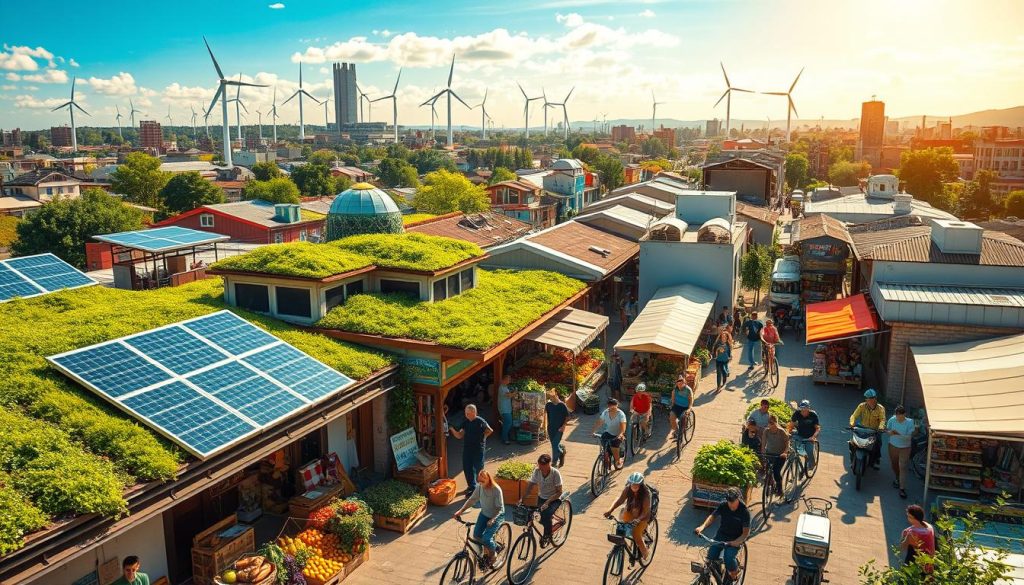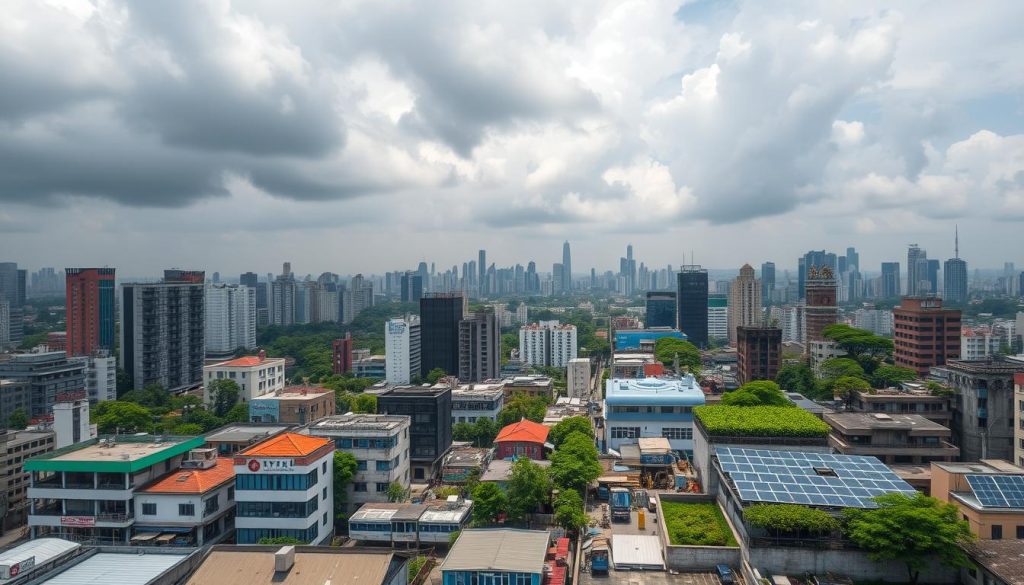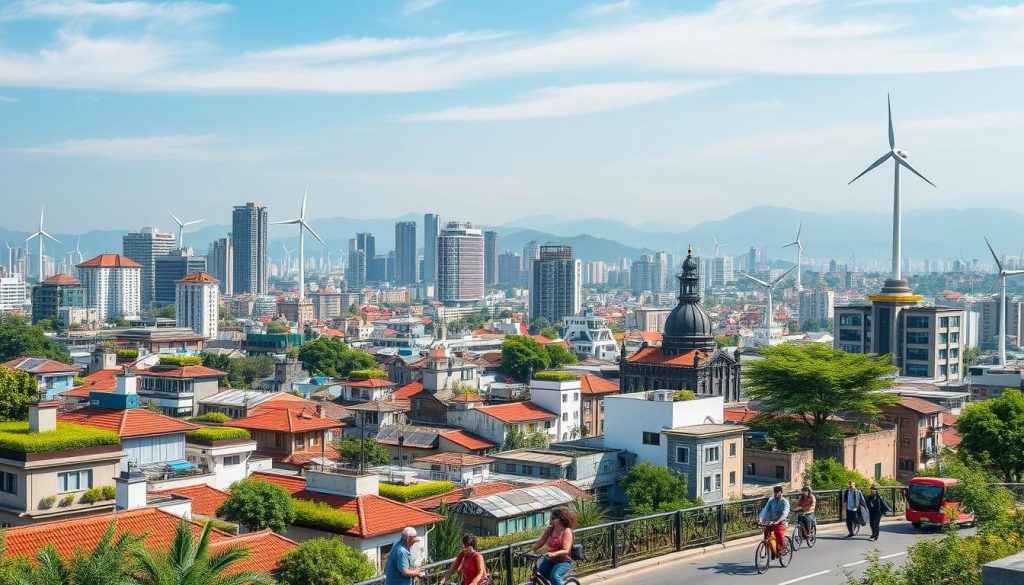The rise of eco-friendly businesses in Asia is a big step towards a greener future. This change is driven by growing environmental worries. Governments and industries are working together to make the region a leader in the green economy.
Asia is seeing fast growth in its green markets. This shows it’s a key place for new eco-friendly ideas. This growth is not just about making money. It’s also about taking care of our planet.
Understanding the Green Business Landscape in Asia

The green business scene in Asia has changed a lot lately. This change is thanks to more people caring about the environment and wanting to be sustainable. Governments, public awareness, and global trends all play a big part in this shift.
Asian governments are now pushing for green practices. They offer support for renewable energy and encourage buying sustainable products. This helps businesses look good and can even save them money.
More people want to buy products that are good for the planet. This means companies that focus on being eco-friendly are doing well. As businesses adapt to these needs, the green market is growing, opening up new chances for success.
- Emerging trends indicate greater emphasis on sustainable supply chains.
- Businesses prioritising waste reduction and resource efficiency are gaining competitive advantages.
- The evolution of corporate social responsibility is redefining how brands interact with consumers.
Emerging Trends in Sustainable Development

The world of sustainable development in Asia is changing fast. New practices show a strong focus on green innovation. These changes are making businesses and consumers think differently about products and services.
There’s a big move towards circular economy models. These aim to cut down waste and use resources better. This not only helps the planet but also meets what eco-conscious consumers want.
Green certifications are becoming more popular. They help businesses stand out in a crowded market. These certifications show a company’s dedication to the environment, building trust with green-minded customers.
Also, cities are planning to be more sustainable. They’re adding green spaces and encouraging eco-friendly transport. This is a big step towards a greener future.
Studies show more people are choosing eco-friendly products. This change in consumer behaviour is pushing businesses to offer greener options. As more people look for green choices, it’s key for companies to be open about how they make things.
The Economic Importance of Eco-friendly Practices

Eco-friendly practices are now key to business success. They bring big economic benefits. Companies that adopt these practices help the environment and save money.
Reducing Operational Costs
Using eco-friendly methods cuts down on costs. Businesses save on energy bills by using efficient tech. They also reduce waste and boost recycling.
This not only increases profits but also gives them an edge over competitors.
Attracting Investors and Stakeholders
More investors want to back sustainable businesses. Companies that focus on sustainability attract these investors. This appeal leads to more funding and partnerships.
Regulatory Frameworks Supporting Green Initiatives

Green business in Asia gets a big boost from government rules. These rules encourage companies to be eco-friendly. Countries in Asia are setting up green regulations in Asia to help. They offer money help, subsidies, and strong policies to push for sustainability.
In places like Japan and South Korea, there are detailed environmental laws. These laws help businesses use green tech. They get tax breaks for using renewable energy, making it easier to start green projects.
These rules make Asia a great place to invest and help companies be more responsible. They include:
- Money help like grants for cleaner tech.
- Subsidies for switching to greener ways.
- Rules that make companies report on their green efforts.
How well these rules work can change a lot from country to country. By checking how they do, governments can make them better. This helps more companies follow the rules and reach environmental goals.
Key Sectors for Eco-friendly Business Opportunities in Asia

Asia is full of chances for eco-friendly businesses in many areas. Each sector is growing fast, thanks to more people caring about the planet and laws that help. Here are the main sectors for green business, offering great chances for renewable energy, sustainable farming, and managing waste well.
Renewable Energy
The renewable energy sector in Asia is growing fast, with lots of chances for investment and new ideas. Countries are putting a lot of money into solar and wind power to meet energy needs and cut down on carbon emissions. This is because of laws that push for more renewable energy, drawing in investors from around the world.
- Rise of solar power installations across urban areas.
- Increase in wind energy projects along coastal regions.
- Development of energy storage solutions for enhanced efficiency.
Sustainable Agriculture
Farming in a way that’s good for the planet is becoming more popular. Farmers are using methods like organic farming, permaculture, and integrated pest management to grow more food while protecting the environment. These methods are not only better for the planet but can also make farmers more money.
- Use of organic fertilisers to minimise chemical dependency.
- Implementation of crop rotation and polyculture techniques.
- Promotion of local food systems to reduce carbon emissions.
Waste Management and Recycling
Waste management and recycling are also big opportunities for eco-friendly businesses. With the need to solve waste problems in big cities, new solutions are needed. Good recycling programs and turning waste into energy are key to managing waste well and creating a closed-loop economy.
- Implementation of advanced recycling technologies for plastics and metals.
- Development of composting facilities to reduce organic waste.
- Promotion of zero-waste initiatives among communities.
Eco-friendly Business Opportunities in Asia

Asia is full of chances for eco-friendly businesses. These ventures meet the growing need for sustainable products. They offer profits and help protect the environment.
Renewable energy is a big hit in Asia. Companies using solar and wind power are becoming more popular. Sustainable farming, like vertical farming and organic growing, also cuts down on environmental harm.
Waste management and recycling are key in eco-friendly businesses. New ways to sort and reuse waste are being found. This helps reduce pollution and creates new business opportunities.
Entrepreneurs are using technology to make eco-friendly products more accessible. They create apps that encourage people to live more sustainably. These efforts show how big of a difference eco-friendly solutions can make.
Case Studies of Successful Green Businesses in Asia

Asia has seen a big rise in eco-friendly companies. These businesses show new ways to be sustainable. They come from different industries, all working to be green.
Tesla has led the way in clean energy. They make cars that don’t pollute and work hard to cut down on waste. This has made them popular with customers and successful in the market.
Patagonia is another great example. They make clothes that are good for the planet. They use recycled materials and treat workers fairly. This makes them stand out as leaders in green business.
These companies are key examples for green efforts. They show us how to succeed in a sustainable way. They help guide Asia’s growing market towards a greener future.
The Role of Technology in Green Innovations

Technology is key in pushing green innovations in Asia. It shows how digital tools help make eco-friendly practices easier. Companies use tech to manage resources better and cut down on waste.
Many advancements show tech’s role in sustainability:
- Smart energy systems make renewable energy use more efficient.
- Data analytics help make better choices in sustainable farming.
- New recycling tech improves waste handling, making cities cleaner.
Nations in Asia are also getting on board with these green ideas. The market for clean tech is growing fast. This not only tackles environmental issues but also makes countries leaders in sustainability.
Public and private partnerships are making a big difference. They show how working together can lead to big eco-friendly wins.
Market Demand for Sustainable Products and Services

The demand for sustainable products has grown a lot in Asia’s different sectors. People are becoming more aware of environmental issues. This has made them choose eco-friendly options more often.
Brands that offer green alternatives are getting more popular. This shows how market tastes are changing.
More people are ready to spend extra for sustainable choices. They’re willing to pay more for products that are good for the planet and made ethically. This is seen in the rise of organic foods, renewable energy, and upcycled goods.
Companies need to understand and meet this growing demand. Knowing what eco-aware consumers want can help businesses grow. By focusing on sustainability, brands can stand out in this booming market.
- Capitalising on sustainability trends fosters brand loyalty.
- Engaging in transparent communication about eco-friendly practises enhances consumer trust.
- Investing in research and development focused on green innovations can yield competitive advantages.
Challenges Facing Green Businesses in Asia

Green businesses in Asia face big challenges that can slow their growth. One major hurdle is the complex regulatory landscape. This makes it hard for sustainable firms to know what to do.
Changes in regulations can also affect businesses. They need to keep up with these changes to avoid problems.
Regulatory Hurdles
Regulations can create many bureaucratic barriers for green initiatives. Businesses often get caught up in paperwork and compliance. This takes a lot of resources.
- Inconsistent laws lead to different levels of compliance in countries.
- Slow approval for eco-friendly projects delays launches.
- Different levels of government support can greatly impact operations.
These issues are big challenges for green businesses in Asia. Fixing these regulatory problems is key to a strong sustainable business ecosystem.
Market Penetration Strategies
Getting into new markets is tough for sustainable firms. They need to understand local customers well. Good strategies include:
- Doing deep market research to find out what customers want.
- Partnering with local companies to make entry easier.
- Using digital marketing to promote eco-friendly products.
Using these strategies can help green businesses succeed in Asia. By tackling these challenges, they can grow and help the green economy.
Investment Opportunities in Green Technology

The green tech market in Asia is booming, offering big chances for investment. More people want sustainable solutions, so investors are looking at green tech. Startups in clean energy, waste management, and farming are getting a lot of attention.
Venture capital firms see the big money in green tech, leading to more investments. Governments also help with grants and subsidies. This makes projects to cut carbon emissions more likely to succeed.
Key trends driving the green tech market include:
- Rising consumer awareness about sustainability.
- More support from laws for green practices.
- Advances in tech making solutions better and more effective.
Investors are now keen to fund new, green ventures. This move helps the planet and can bring good profits. It shows the value of investing in green tech.
Consumer Awareness and Education on Sustainability

In Asia, more people are learning about living sustainably. This knowledge helps them make choices that are better for the planet. Education is key in teaching people to live in a way that protects our environment.
There are many ways to teach people about living sustainably. Educational programs and campaigns spread the word about green practices. They help people change their habits to be more eco-friendly.
- Workshops that teach recycling and waste management techniques.
- Online platforms offering courses on sustainable agriculture and ethical consumption.
- Community events to promote the use of renewable energy solutions.
These efforts help people choose sustainable products. When they know more, they prefer brands that care about the planet. This shows how important education is in making sustainable choices.
The Impact of Globalisation on Green Businesses

Globalisation has a big impact on green businesses around the world. As markets grow and cultures mix, green businesses in Asia see both chances and challenges. The need for businesses to keep up with changing consumer wants for sustainability grows stronger.
By working with global partners, local companies can use new ideas and tech. This makes them more competitive. Working together can also mean sharing resources, learning from each other, and reaching more customers. This helps green businesses grow.
- Access to global funding sources supports sustainable projects.
- Cross-border collaboration enables sharing of best practices.
- Increased competition in international green markets pushes for innovation.
But, the global scene also brings risks. For example, relying too much on international markets can be risky. Different rules and standards can make it hard for local businesses to follow them. It’s important to understand how globalisation affects sustainability to deal with these issues.
Collaboration between Businesses and Governments

Working together, businesses and governments are key to making our world greener. They team up to create a sustainable economy. This partnership boosts both the environment and the economy.
There are many examples of this teamwork paying off. For instance, in renewable energy, government support meets business investment. This leads to better solar and wind power, cutting down carbon emissions and creating jobs.
- Joint ventures in sustainable infrastructure have fostered innovation.
- Training programmes enhance workforce skills in eco-friendly practices.
- Research partnerships aid in the development of green technologies.
By working together, we can tackle climate change better. This partnership helps us build a strong future for all.
Future Outlook for Green Markets in Asia
The future of green markets in Asia is bright. This is thanks to more people becoming aware of the need for sustainability. Experts predict a big increase in eco-friendly businesses, showing a wider commitment to sustainability in Asia.
Government support is also key. They are stepping up to promote green initiatives. This makes them important players in the changing market.
For eco-friendly businesses to thrive, they need to innovate and adapt. As technology improves and environmental issues grow, companies must change their ways. This will help them grow and stay competitive in the sustainable market.
Working together, businesses and policymakers will shape the future. Their collaboration will set standards, attract investments, and support green innovations. This teamwork will guide the growth of green markets in Asia, leading to a more sustainable economy.
















